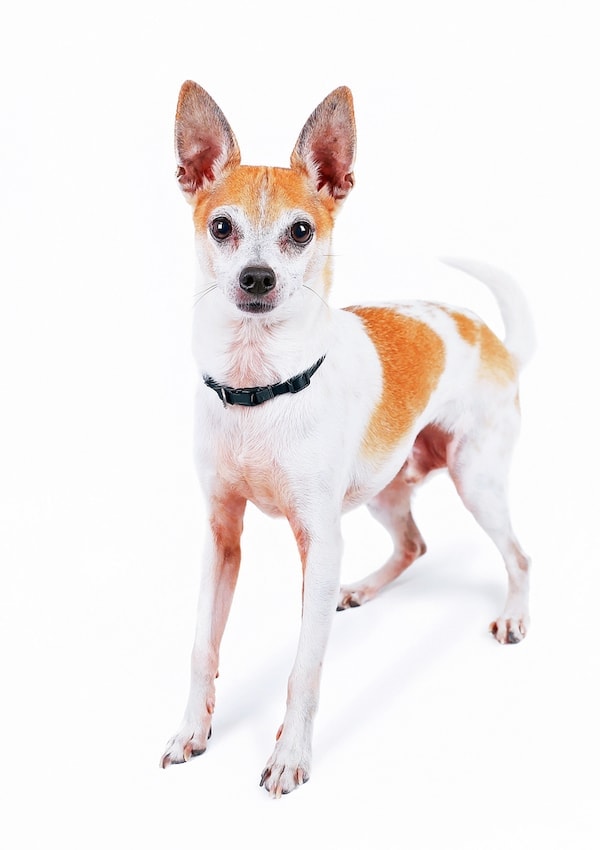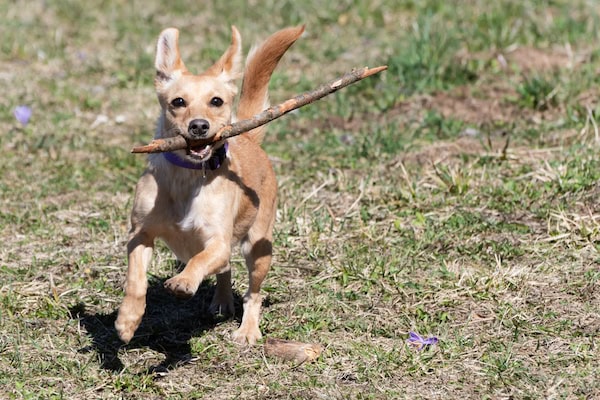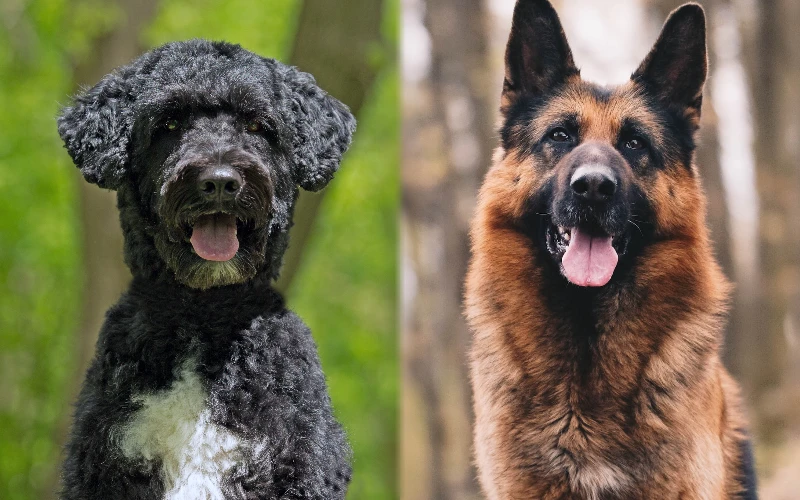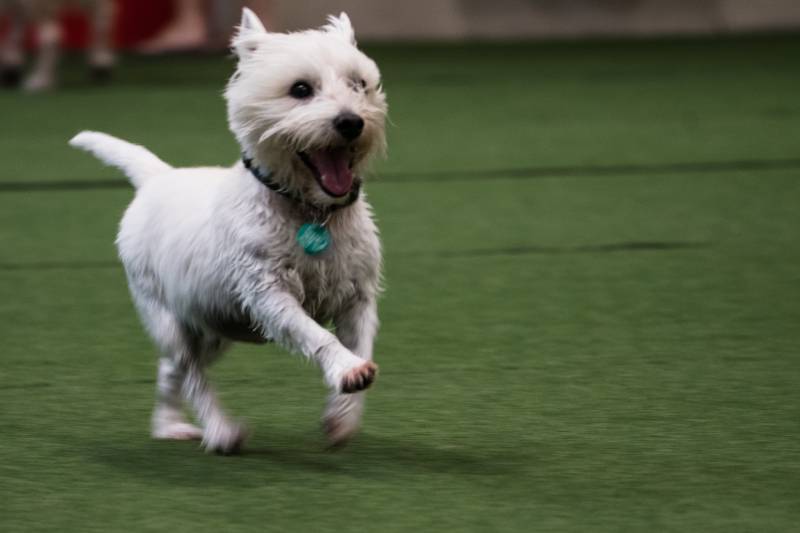Rat-Cha (Rat Terrier & Chihuahua Mix): Info, Pictures, Facts

Updated on

Height:
10–16 inches
Weight:
10–15 pounds
Lifespan:
12–18 years
Colors:
White, black, brown, sable, red, gray, fawn
Suitable for:
Those wanting a small dog with a great deal of energy; apartment living
Temperament:
Protective, fierce, affectionate, suspicious of strangers
If you’ve ever looked at a Rat Terrier and thought, “Yeah, it’s cute, but it’s too big,” then you’re in luck. Meet the Rat-Cha, which is an American Rat Terrier crossed with a Chihuahua.
These dogs may be little, but the Rat-Cha has big spirits. Their ferociousness can put much larger dogs to shame, for better or worse. The Rat-Cha can actually make a good guard dog, but you must take care not to let them get too aggressive.
The Rat-Cha isn’t a common breed, and they may suffer from stereotypes attributed to both parent breeds. In order to combat these assumptions, we put together a guide to this breed so you can learn the truth about these feisty little pups.
Rat-Cha Puppies

Rat Terriers and Chihuahuas are both fairly common breeds, so you may think you already know everything you need to about Rat-Chas. However, the hybrid version of these pets has its own challenges, so you’re better off doing some research before you bring one home.
These dogs tend to retain much of the Chihuahua’s personality but in a slightly bigger package. That means that if you allow yours to get aggressive, there’s potentially more damage to be done. Fortunately, you can mitigate that aggressiveness with proper training and socialization.
That’s not to say that these pups aren’t sweet, as they can be incredibly affectionate. However, they tend to latch onto a single person and direct all their love to them while being suspicious of others. This can be great for single dog owners, but it’s less than ideal for social butterflies.
3 Little-Known Facts About the Rat-Cha
1. They Have Incredibly Long Lifespans
These dogs can often live up to 18 years, if not longer, so you’ll be making quite a time commitment if you adopt one. That’s great in terms of maximizing the amount of time you spend together, but it also means you shouldn’t take adopting a Rat-Cha lightly.
2. Their Eyes Are Big, But Not Bulgy
Chihuahuas are known for their bug-eyed appearance, and while Rat-Chas have prominent peepers, their eyes don’t bulge out quite as much as their parent breeds’. They are often deep-set and soulful, making them one of the first things you’ll notice on these dogs—and don’t think that they don’t know how to use them to great effect!
3. Rat-Chas Will Permanently Affix Themselves to Your Lap
They’re called lap dogs for a reason—and Rat-Chas take that label to heart.
These pups love nothing more than to climb in your lap and stay there as long as possible. We don’t know if it’s because they feel safe there, they like the warmth, or they simply love you that much, but whatever the reason, you can expect to have one of these dogs climb into your lap every time you sit down.
- We reviewed the best couch covers for dog hair – see our top picks here!

Temperament & Intelligence of the Rat-Cha 🧠
Rat-Chas are smart dogs, but they don’t often use their intelligence in the same way that many other brainy breeds do. Rather than trying to figure out puzzles or spending hours learning new commands, these dogs just want to sit in their favorite person’s lap and soak up attention—and it doesn’t really require much brainpower. However, their intelligence is on full display when it comes to tasks like housetraining. These dogs pick up on the idea incredibly fast, and you’re not likely to have many accidents.
Temperamentally, Rat-Chas tend to lavish devotion on a single person while being wary (if not downright aggressive) toward others. As a result, the owner often has a much different perception of the dogs than outsiders do.
While they’re not especially dangerous, you should still curb their aggressive tendencies as much as possible. It’s for their own good as well; after all, you never know when they might pick a fight that they can’t win, like with a bigger dog.
Are These Dogs Good for Families? 🏡
Rat-Chas often bond with a single person. That means that they won’t have much of a connection with the rest of the family and may even be snappy toward them. This can be a real problem if you have small children. The last thing you want is for your kids to be scared of approaching you because you have an ill-tempered dog in your lap, so you should either work to make the Rat-Cha accept the kids or bring another dog home.
We’d generally encourage the latter option, but if you’re looking for a dog who’s totally devoted to you and you alone, you can’t do much better than the Rat-Cha.
Does This Breed Get Along With Other Pets? 🐶 😽
Rat-Chas don’t have the same pack mentality that many other breeds do, so they won’t necessarily feel the need to bond with another dog. They’re actually prone to aggression toward other dogs, especially if that other pooch approaches their beloved human; as you can imagine, this often doesn’t end well for the Rat-Cha.
If you can get your Rat-Cha to accept another pup, that doesn’t mean they’ll play with them. Rat-Chas like to do things on their own terms, so play bows and similar invitations will often go ignored. This can be frustrating to the other dog. Rat-Chas have a fairly strong prey drive, so they may try to chase down cats or other small pets. Socialization can help temper this but don’t expect miracles.
With enough training and socialization, you can convince your Rat-Cha to tolerate just about any other animal, but overall, we’d recommend limiting yourself to just the Rat-Cha if you decide to bring one home.

Things to Know When Owning a Rat-Cha
Rat-Chas are a fairly low-maintenance breed, but that doesn’t mean that there aren’t important details you should know before owning one.
Food & Diet Requirements 🦴
You can probably guess just from looking at them that Rat-Chas don’t eat much. However, they’re even less food-motivated than you might expect, and they can often forget to eat if you don’t remind them. Despite their frequent disinterest in food, these dogs can be prone to obesity. That’s usually due more to eating endless amounts of treats while laying on their owner’s lap than scarfing down too much kibble, though.
You’ll want to feed these dogs healthy, high-protein food without too many calories. Feed them at designated times, and pick the food up when they’re done; free-feeding should be discouraged.
Exercise 🐕
Rat-Chas are content to spend all day lazing around in your lap binge-watching Netflix, so you wouldn’t think they’d need much exercise. However, the breed has surprisingly high energy levels. Luckily, they also have incredibly short legs, so it doesn’t take much to tucker them out. A short, brisk walk or two should be all they need to burn off any excess energy.
Keeping them physically exhausted is also a great way to help with aggression issues, but it’s not a substitute for a dedicated training regimen.
These dogs love to play, but only if they call the shots. They don’t often respond well to being forced to participate in games, so you may have trouble getting them to chase a ball or tug on a rope.

Training 🦮
These pups need training and socialization. You may be tempted to forego it because they can’t do much damage if they attack, but that would be a mistake. You should work on their natural aggression from the first day you bring them home. Introduce them to a wide variety of people, places, and animals, and be sure to praise and reward them for acting calm and confident.
Resource guarding is a huge issue with Rat-Chas (and that resource is often your attention), so spend your training time dealing with that. Don’t let them become protective of food, toys, or your lap, or else you could have a ticking time bomb on your hands.
While training is essential, don’t expect your Rat-Cha to be as obedient as a Golden Retriever. These dogs usually aren’t fond of learning a ton of tricks; that’s not to say they can’t be taught, just that they won’t respond as enthusiastically as some other breeds do.
Grooming ✂️
Rat-Chas have short, bristly coats and they shed a moderate amount. You should brush them at least once a week or so, but don’t expect miracles—often, your best bet is to simply vacuum up after them every so often.
These dogs are extremely prone to dental problems, especially later in life, so spend time keeping their teeth clean. You should brush them every day if possible, and be wary of giving them extremely hard objects like bones.
You’ll need to trim their nails regularly, especially since Rat-Chas don’t often walk enough to file them down themselves. Bathing should be done on an as-needed basis.
Health and Conditions ❤️
Rat-Chas have extremely long lifespans, but that doesn’t mean that all those years will be healthy ones. These dogs are prone to experiencing a variety of diseases and conditions.
- Atopy
- Cataracts
- Progressive retinal atrophy
- Dental issues
- Glaucoma
- Alopecia
- Legg-Calve Perthes disease
- Hip and elbow dysplasia
- Collapsed trachea
- Hydrocephalus
- Patent ductus arteriosus
- Diabetes
- Hyperthyroidism
- Patellar luxation
Male vs. Female
Male Rat-Chas often tend to be a bit bigger than their female counterparts, but they’ll never be mistaken for big dogs. Both sexes should be small, lightweight, and easy to carry.
If not fixed, female Rat-Chas can be more aggressive and prone to resource guarding, especially after having puppies. However, most hormonal issues can be solved by having the dog spayed or neutered.
Final Thoughts
Rat-Chas may be tiny but they have big spirits, and these feisty dogs have no problem making their presence known. Owning one isn’t for everyone, as Rat-Chas can be prone to aggression and other behavioral issues, but their devotion to their humans makes them beloved pets.
They’re especially good for single apartment dwellers, as Rat-Chas don’t need much room and prefer to spend most of their time curled up on their favorite person’s lap. This dog won’t make a great workout partner, but if you’re looking for a “The Bachelor” watching buddy, you can’t do much better than a Rat-Cha.
Featured Image: Annette Shaff, Shutterstock














